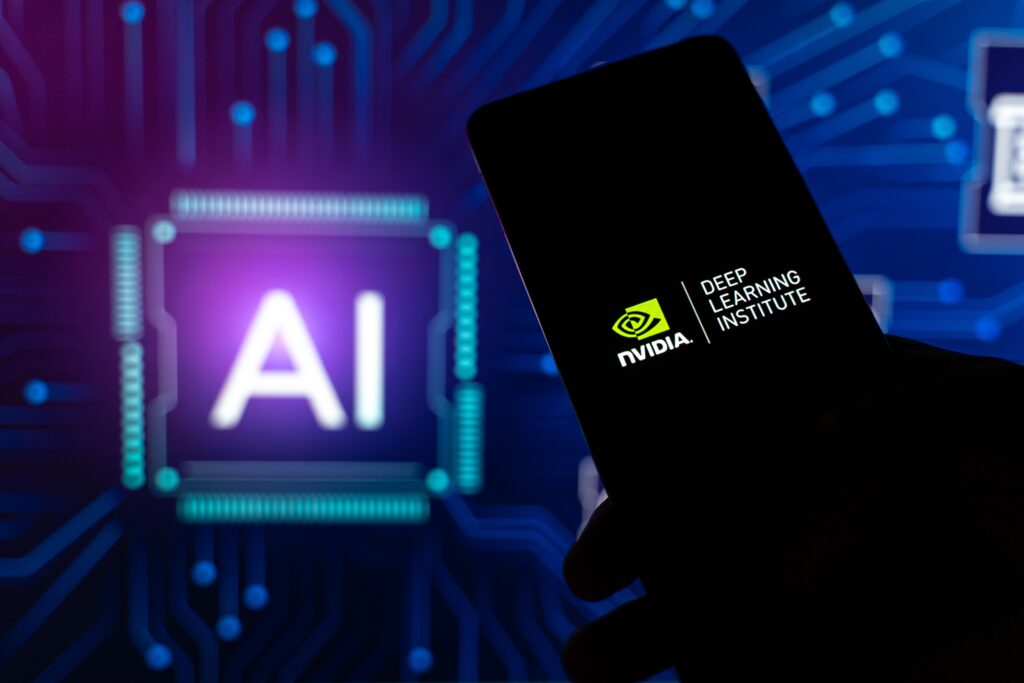Nvidia continues to smash records as artificial intelligence reshapes the tech industry, though international disputes cast a shadow over its future.
On Wednesday, the Santa Clara-based chipmaker reported $46.7bn (£34.6bn) in revenue for the second quarter, a 56% increase from the same period in 2024.
Despite the strong earnings, shares slipped in after-hours trading after executives admitted the company was still “working through geopolitical issues”. Nvidia remains caught in the escalating trade battle between Washington and Beijing.
Frequent policy shifts from the Trump administration, aimed at keeping the US ahead in artificial intelligence, create further uncertainty for the company.
Rising demand from big tech
Nvidia’s chips have become essential tools in the global AI boom.
The company reported strong demand from major technology players such as Meta, the owner of Instagram, and OpenAI, the developer of ChatGPT. Both firms are investing heavily to expand their AI infrastructure.
“The AI race is now on,” said Nvidia chief Jensen Huang during a call with analysts. He revealed that four large tech giants had doubled their annual spending to $600bn.
“Artificial intelligence will accelerate GDP growth over time,” Huang added. “We are providing the backbone for that acceleration.”
Market experts view Nvidia as unmatched in its field. Colleen McHugh, chief investment officer at Wealthify, described the company as “the heart of the AI boom”.
She noted Nvidia’s heavy reliance on tech giants’ investments. Continued spending, she said, would ensure both revenue growth and higher share prices.
Revenue from data centres rose by 56% to $41.1bn but came in slightly below analyst expectations. Investor Eileen Burbridge, founding partner of Passion Capital, said the weaker performance in this area triggered the “share price wobble”.
Even so, she called the company’s progress “unbelievable” but warned of risks tied to excessive market enthusiasm.
In July, Nvidia became the world’s first $4trn company. It now forecasts $54bn in revenue for the current quarter, topping Wall Street predictions.
Politics cloud future growth
Despite record-breaking sales, Nvidia faces mounting challenges from global politics.
In July, the company confirmed plans to resume sales of its high-end AI chips to China. The move followed lobbying from Huang, who convinced the Trump administration to lift its ban on the H20 chip, built specifically for Chinese buyers.
The ban had been imposed due to concerns that the chips could benefit China’s military as well as its AI developers.
Executives said that by late July, US officials began reviewing licenses for H20 sales. Some Chinese firms secured approval, but Nvidia has not yet delivered the chips.
The US government expects to claim 15% of revenue from licensed H20 sales. Nvidia excluded the H20 from its latest forecast and continues lobbying for approval to sell its new Blackwell chips in China, the world’s largest chip market.
Meanwhile, Beijing is speeding up efforts to grow its own semiconductor industry. “US export restrictions are fuelling Chinese chipmaking,” said Emarketer analyst Jacob Bourne.
He added that Nvidia’s long-term role as “the bellwether of the AI economy” may depend on whether its expansion into robotics secures its dominance.


